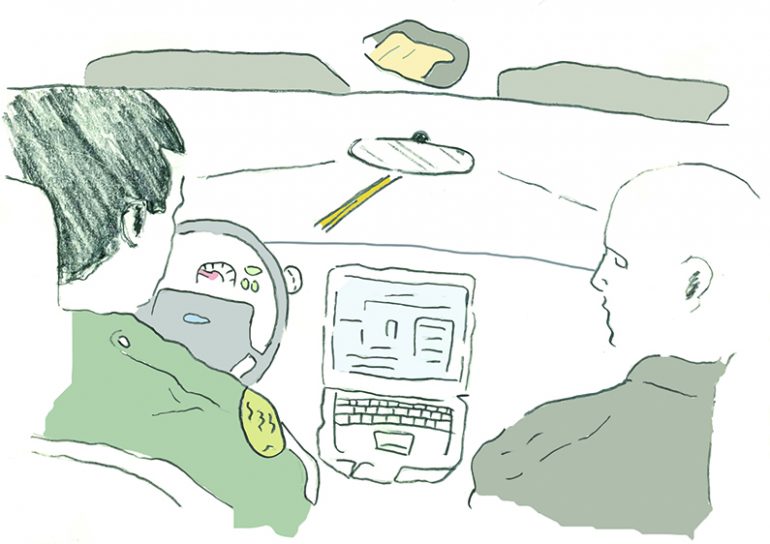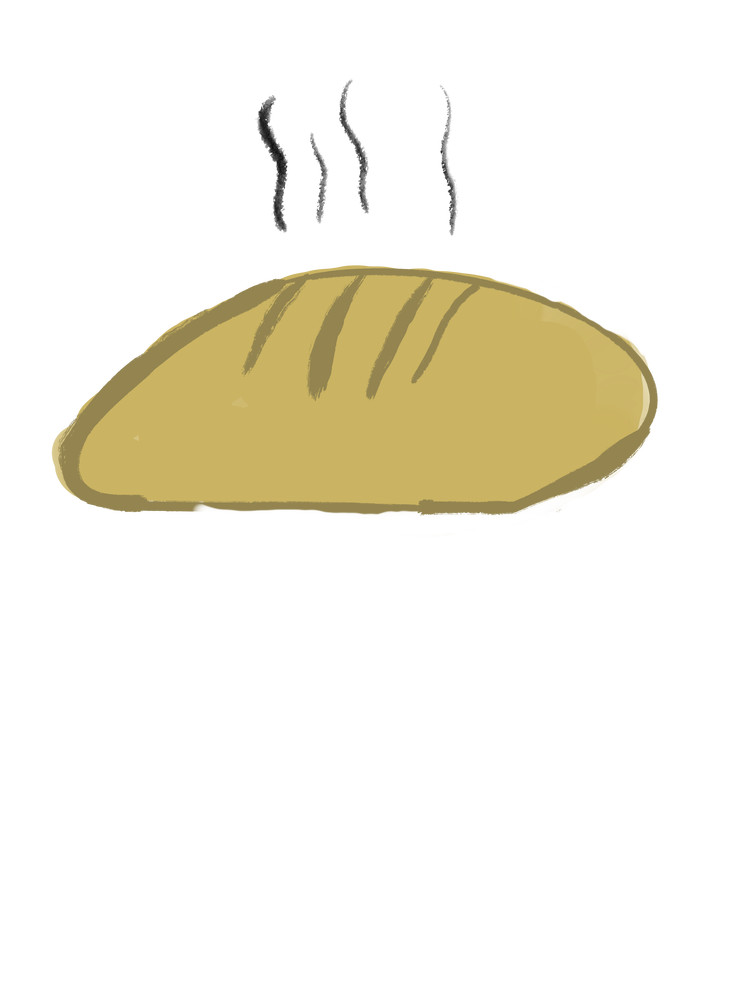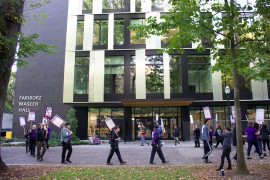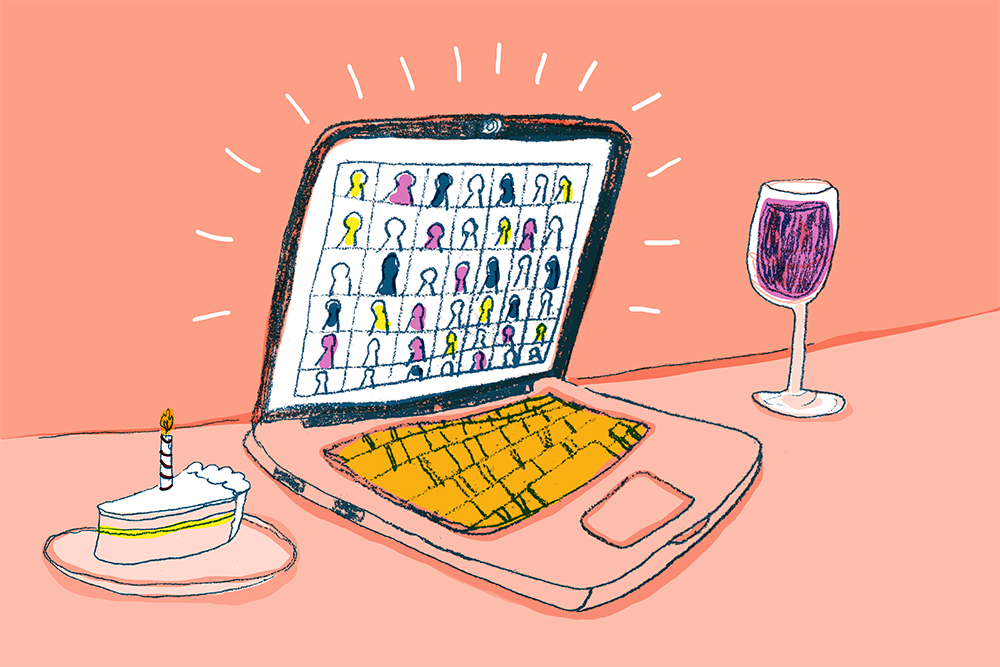Portland State University’s campus police are, as Officer Matt Masunari says, “a small police agency in a big city.” The jurisdiction of the Campus and Public Safety Office (CPSO) extends only as far as the campus itself: I-405 in the south and west; Market Street at the north end; and the buildings of SW 4th Avenue to the east. Two-way radios in the vehicles and at the office monitor activity on the channels of the Portland Police Bureau (PPB) to enable the agencies to cooperate when necessary; Masunari says situations requiring interagency work are infrequent.
Night shift at CPSO begins at 11 p.m. On a cold and rainy Saturday night in early April, I accompanied Officer Matt Masunari on his duties for about three hours to see what a day in the life of a police officer is like. Contrary to my assumptions, the weekend nights are quiet for CPSO. During the first part of the shift, since the Police Interceptor was in the shop, Officer Masunari drove the Ford Crown Victoria on the streets bordering and running through campus, making the occasional detour to slowly drive through its parking structures and parking lots. As we made our rounds, our conversation moved to times past.
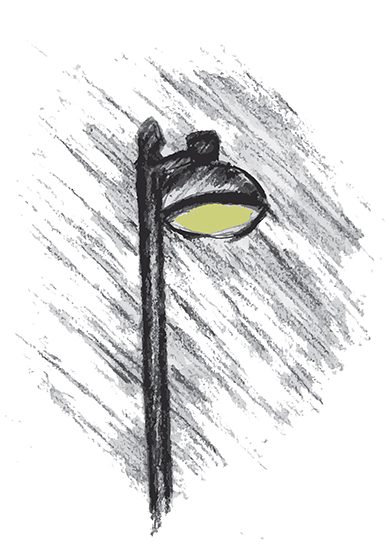
Before his career as a CPSO officer began in 2015, Masunari studied ancient Latin and Greek literature at Oregon State University. He came to PSU as a graduate student with a particular focus on 3rd century BCE Roman history. Masunari’s former judo instructor and mentor from Corvallis had already moved to Portland and told him of a job opening at CPSO. Masunari applied and has now been with the agency for over four years.
Masunari’s dedication to police work is matched by his passion for the literature and history of the Hellenic world. “The Roman Republic was a unique time in Roman history,” Masunari said. “They integrated other peoples as citizens more completely than Sparta or Athens did.” This confederation of Italian and Gallic tribes lasted five hundred years before the Senate granted Octavian unprecedented power as Augustus, making him the first true Roman emperor.
The squad car moved slowly through the University Place Hotel’s dark parking lots, its beams illuminating small patches of the night. Our discussion continued. “Augustus had major legitimacy issues,” Masunari said of the Roman emperor’s attempts to justify autocratic rule to the citizens of a republic with nearly half a millennium of history and precedent. Augustus commissioned Virgil to compose The Aeneid to link the new form of monarchy and its male lineage to the Homeric epics and Hellenic legend. “The Iliad is about losing innocence and The Odyssey is about trying to come back after loss and trauma. The Aeneid is a story about the emergence of Roman masculinity,” says Masunari.
Our rounds brought us into the parking garages, nearly empty at this time on a Saturday night. While driving the perimeter of each tier, our talk moved to the present day and the issues at hand for PSU campus police. The drugs heroin and methamphetamine are CPSO’s primary concern, followed by property crime. These problems are a reflection of PSU’s central urban location; it is not necessarily students or faculty that are engaged in the use or sale of dangerous drugs, but homeless and transient populations camped within or near the campus boundaries. In the lower level of one parking garage, we walked on foot to check stairwells and behind pillars. The search revealed a recently abandoned camp and discarded drug paraphernalia—and “some fun graffiti and feces” on the wall, as Masunari wryly observed.
As he drove the squad car north on wet streets lit by the lamps of shuttered food carts and traffic lights, Masunari described a drug-related incident a few nights before my observation; someone on campus had a bad reaction to LSD and began acting in a manner that endangered others. Paramedics were called. (Most details of incidents discussed, such as the identity of persons of interest and association with PSU, are confidential and were not made available for publication.) “Drugs are a public health issue,” says Masunari. “There is a misconception that drug use is a victimless crime…There is a criminal element in the sale of some drugs.” Crimes against persons and property are committed in the production and transportation of drugs such as methamphetamine that harm people and their communities in far-reaching ways. Drug addicts “are not just hurting themselves,” says Masunari. “They hurt society by being driven apart.” In addition to the loss of our fellow men and women to addiction, money from the sale of the drugs can be linked to other criminal activity. Addiction to drugs, however, is not evil. Expanding on this, Masunari said that “drugs are not a moral failing by people who use them.”
Drug use, property crime, homelessness, availability of mental health treatment options, and urban blight are intertwined. While driving east on Market Street, Masunari talked about the news channel special report, Seattle is Dying. “That is exactly what’s happening here. We’re creating a population that is completely forgotten and absolving ourselves of their welfare,” he says referring to our society as a whole. “It’s doing irreparable harm. That doesn’t mean we should stop trying, that we shouldn’t do our best. I can only do what’s in front of me.”
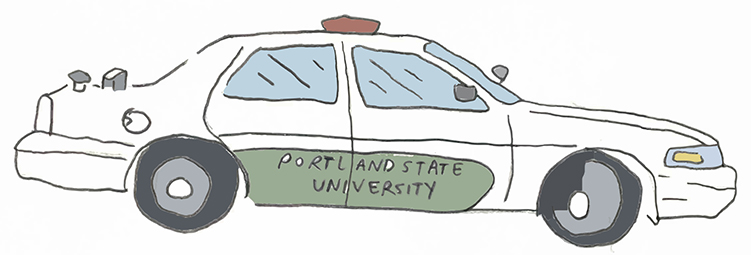
Masunari brought the vehicle to a stop on a street near I-405. He turned on the body camera used to record all interactions (standard issue for sworn campus police officers since 2015) and we spoke with some people at a homeless camp. One man spoke freely with Masunari, but the others were wary or ignored us entirely. Another man crouched while using a large knife to pick at a broken piece of an electronic device. Masunari shined his flashlight on the man’s project after the man indicated that this would be helpful. A woman carrying large bags walked from one part of the camp to another; she ignored Masunari’s greeting her by name.
Back in the car and driving again under the falling dark rain, Masunari pointed out that we saw one man with a large knife, but that all the others in the camp likely had knives of their own. Some of the camp residents likely had drugs. The camp is technically illegal, and the human waste and discarded drug paraphernalia are a hazard to others; why did he not bust the camp? “If I tell them to move, what benefit is that to me, to society? I think of them as coworkers. We have a professional working relationship.” Masunari stresses that much is left to the discretion of officers. When is it appropriate to break up a camp? When is arresting a homeless person for loitering or panhandling beneficial to him or her and to society?
As evidenced by the woman who ignored Masunari’s greeting, the relationship is a tense one; the woman’s standing in the camp could be affected by being perceived as close with the police. Many homeless do not trust the police, but the police have also intervened to help; Masunari told a story about tents in one camp being burned by an outsider, and the CPSO responded and were able to keep the resident of the tent safe from the arsonist who returned with intent to inflict further harm.
The resources available to the homeless, often addicted and mentally ill, are so paltry that to allow them to live in the most stable way they can is the best temporary solution. The people in this camp, and other homeless living near campus, are known to CPSO, and can sometimes help monitor the goings on. When driving through a particular part of campus (details kept vague to protect the person described), Masunari pointed out a homeless man known to him who usually spends the night near a street lamp on campus. The man is trespassing and could be arrested for doing so, but because he is stable and unobtrusive his presence deters unknown persons with ill intent from committing real harm.
I asked Masunari’s perspective on the disarmament protests of fall term. Our conversation, and the larger campus and cultural discourses, are too complex, too nuanced, too abstract, and too specific to do justice in a short article. Instead I offer fragments of a one discussion on one particular night, with minimal journalistic commentary and reordering, to provide an incomplete sketch of one policeman’s perspective.
“I’m just a guy trying to make it better.
“I believe in my heart of hearts that this is an absolutely essential institution.
“I think there was a lot of otherizing. I really do my best not to do that in my job.
“It was very hard coming in to work every day. This job is important.
“They don’t see what I see. I’m not discounting what they see…
“Things were said that were disappointing.”
What about the push for disarmament? “Firearms are tools for doing police work in the United States. I wish that I didn’t have to have a gun. I wish that people didn’t hurt each other, steal from each other.” Masunari described an incident when an officer, not carrying his firearm at the time, encountered an unlawful actor in a campus parking structure with a gun. He had to run; there was no way to resolve the situation without having more leverage than the person of interest. The gun is does not license unreasonable behavior. “It’s important not to use fear or intimidation for compliance.”
“There are a lot of people dedicated to making PSU a safe place. They love this community and love working here. I’m thankful to count myself among them.”
We took a short break at the CPSO office some time after midnight. A call came in. A motion detector on the second floor of Simon Benson Hall (SBH) sent a signal to CPSO dispatch, who sent Masunari and another officer with me in tow, to investigate. “We’re investigating a possible burglary,” Masunari said. “We take that into account when predicting what it will be like if we encounter the suspect because he’ll want to evade capture more than if he were peeing against the side of a building. That is, if he’s not a ghost.”
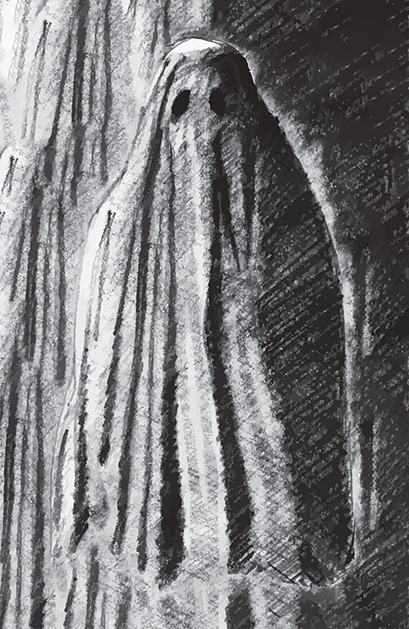
Campus lore, passed from cohort to cohort since time immemorial, holds that SBH is haunted. Masunari and his colleagues have been dispatched many times to investigate tripped motion detectors on the second floor to find no signs of unlawful activity (only logical if the motion sensors on the first floor remain silent on the matter [mixed metaphor?]). The officers must nonetheless treat each call seriously; I waited in the vehicle while the two officers followed protocol for searching and securing the building, flashlights floating through the darkness, sweeping the walls and windows with light.
We were soon on the road again, making the rounds in the car’s confines. What does Masunari think of portrayals of police in film and television? He listed a few favorites: Brooklyn 99, Southland (“a great cop show”), The Departed (“not realistic, but so good”), End of Watch (“realistic”), and 21 Jump Street [neglected to ask if he meant the new or old one]. “You cannot take yourself too seriously as a cop,” Masunari said. “There’s a lot of humor in the job—and a lot of tragedy. The two are linked.”
From my observation, there is also a lot of poetry. Driving the streets and alleys, through and around campus in the late hours. The rain on the windshield refracts the glow of street lamps and neon signs. The many hills, dips, twists, turns, roundabouts, byways, and underground parking garage passages that wend their way around campus. The silence of the interior of the car, moving through the darkness of night, observing that which the headlights illuminate, the world formless beyond their beams.

